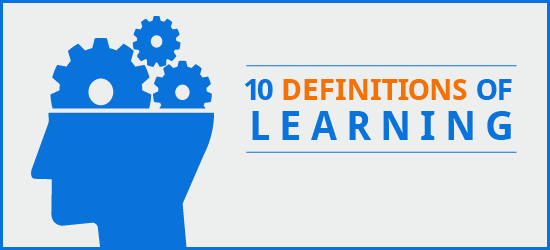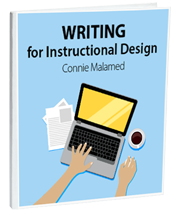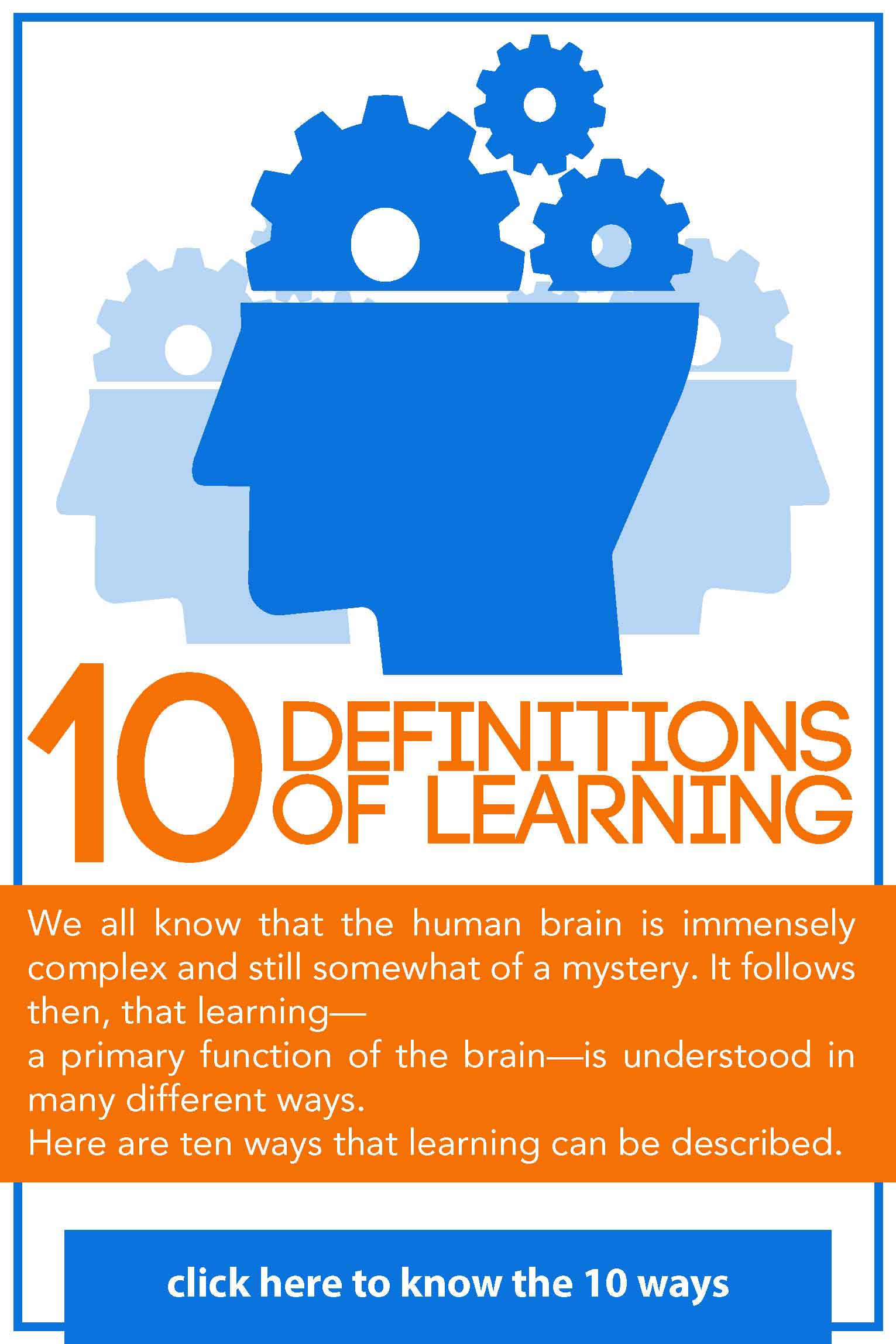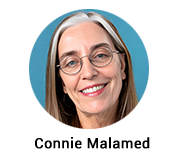
We know that the human brain is immensely complex and still somewhat of a mystery. It follows then, that we understand learning—a primary function of the brain—in many different ways. If you are searching for a definition of learning, these ten explanations show the multitude of ways that learning can be understood and described.
The Definitions
- “A change in human disposition or capability that persists over a period of time and is not simply ascribable to processes of growth.”
— From The Conditions of Learning by Robert Gagne - “Learning is the relatively permanent change in a person’s knowledge or behavior due to experience. This definition has three components: 1) the duration of the change is long-term rather than short-term; 2) the locus of the change is the content and structure of knowledge in memory or the behavior of the learner; 3) the cause of the change is the learner’s experience in the environment rather than fatigue, motivation, drugs, physical condition or physiologic intervention.”
–From Learning in Encyclopedia of Educational Research, Richard E. Mayer - “We define learning as the transformative process of taking in information that—when internalized and mixed with what we have experienced—changes what we know and builds on what we do. It’s based on input, process, and reflection. It is what changes us.”
–From The New Social Learning by Tony Bingham and Marcia Conner - “It has been suggested that the term learning defies precise definition because it is put to multiple uses. Learning is used to refer to (1) the acquisition and mastery of what is already known about something, (2) the extension and clarification of meaning of one’s experience, or (3) an organized, intentional process of testing ideas relevant to problems. In other words, it is used to describe a product, a process, or a function.”
–From Learning How to Learn: Applied Theory for Adults by R.M. Smith - “Acquiring knowledge and skills and having them readily available from memory so you can make sense of future problems and opportunities.” (Listen to an interview with one of the authors.)
From Make It Stick: The Science of Successful Learning by - “A process that leads to change, which occurs as a result of experience and increases the potential of improved performance and future learning.”
From How Learning Works: Seven Research-Based Principles for Smart Teaching by Susan Ambrose, et al. - “The process of gaining knowledge and expertise.”
From The Adult Learner by Malcolm Knowles - “Learning involves strengthening correct responses and weakening incorrect responses. Learning involves adding new information to your memory. Learning involves making sense of the presented material by attending to relevant information, mentally reorganizing it, and connecting it with what you already know.”
From eLearning and the Science of Instruction by Ruth C. Clark and Richard E. Mayer - “A persisting change in human performance or performance potential…[which] must come about as a result of the learner’s experience and interaction with the world.”
From Psychology of Learning for Instruction by M. Driscoll - “Learning is a process that occurs within nebulous environments of shifting core elements – not entirely under the control of the individual. Learning (defined as actionable knowledge) can reside outside of ourselves (within an organization or a database), is focused on connecting specialized information sets, and the connections that enable us to learn more are more important than our current state of knowing.”
From Connectivism: A Learning Theory for the Digital Age by George Seimens
What is your favorite definition of learning? Add your learning definition in the Comments below.
Get the latest articles, resources and freebies once a month plus my free eBook, Writing for Instructional Design.




Learning is the progression in knowledge, technics, understanding, skills, general behaviour of an organism, improvement in actions due to experience, training and also as growth occurs.
Hi all-
Wonderful past efforts here to conceptualize what Learning is.
Weighing in on this interesting challenge, I have tried to avoid two definition pitfalls: 1) making valid statements ABOUT learning; and 2) making valid statements from a limited perspective. Such declarations I offer do not quite reach the criteria for an all-encompassing “definition.”
I think it’s useful to start with a general but succinct statement. For many years, my personal core definition of Learning (similar to some already offered) is as follows: Behavior change as a result of experience. From there, one can elaborate (eg, human and/or sub-human species and organisms), and expand into specialty areas. A key consideration is the type and dimensional locus of Learning, such as Knowledge (knowing stuff), Skills (doing things), and Affect/Attitudes(acquiring views, predispositions, feelings, values and other affect-linked characteristics). The latter framework, of course, tracks with (what I assume is still) formal pedagogical thinking about what constitute “competencies.”
I look forward to additional discussion.
Lee
Learning are those activities that are performed to increases our standard of living.
I like three learning is what changes us and the world we live in:
-Input
-Process
-Reflection
The transformative process of taking in information that—when internalized and mixed with what we have experienced—changes what we know and builds on what we do. It’s based on input, process, and reflection. It is what changes us.”
–From The New Social Learning by Tony Bingham and Marcia Conner
Thanks
Peni
A Positive and long lasting change in the behavior of an individual due to certain experience. Learning my also occurs due to interaction with other individuals like interaction of teacher with students or students interact with each other and share experiences.
All these definitions appear to be carrying a common point. I can define learning as accepting new information , interprete it and then apply it
I am much impressed by the topic of learning.
I would also say that learning refers to the sudden newness that one gains over time.
According to all suggested views, I would recommend that learning is simply the exposure to change and its effects.
Learning is the process of acquiring information, knowledge and using it to make improvements in life
All these definitions are carrying a common point.i haves commended them. However i can also say learning is the process of unlearning something.
Learning is the knowledge that is acquired as you go from the unknown to the known.
These are all great definitions of learning!
To me, learning is always with us in our growth. Not only about academic, but also how we improve ourselves especially in emotional intelligence. Learning is always accompany our life, when we get prior knowledge, we can develop it into new knowledge.
To me learning occurs all the time whether you know it or not. Every thing you hear, see, smell, taste, touch, or reflect consciously or unconsciously becomes the part of your learning which changes you partially. It’s not totally externally rooted. When an idea comes in mind and is processed and matured is also learning
Learning is the process of acquiring new ideas, skills from prior experience being innate in one person.
Learning it’s the knowledge that you get from reading and studying
Learning is a skill that we learn from birth to death and it’s a life-long process.
Learning is a system of knowning something that is new by practicing it
Learning is a process of knowing something new and practicing it.
Learning is any relatively permanent change in behavior that occurs as a result of practice and experience.
Learning can be defined as a process by which one gains from past ideas.
oh ts like on my own point of view.To learn is getting to know things that you dont know maybe via observing someone doing or by being told or maybe via reading manuals. I dont knw if I am right
learning involves a change in behaviour or knowledge that results from experience
Learning cannot be complete without reflecting on the change that has been made and the feedback is what effects the changes and affects the world.
BTW: Learning is not considered permanent due to the process of pruning. However, repetition and periodic review of details improve long-term potentiation. Also, recall of information is not precisely replicated from our memory but actually reconstructed in the associative cortex (imagination). This process is not like retrieving digital data on a computer. Some details are typically modified or missing when reconstructed from multiple areas of the brain.
The brain constantly adapts as we learn new things (neuroplasticity). Neurons send and receive signals across synapses. Stimulating a synapse repeatedly can trigger a state of increased sensitivity known as long-term potentiation. PKMzeta molecules collect into the receiving end of a synapse, increasing sensitivity that works like glue. Research has demonstrated this process can be interrupted by synthetic molecules (Chelerythrine and ZIP) that dissolve the glue without injuring the receptor; in effect, erasing memory. The brain uses natural processes for achieving this when pruning.
Thanks for stimulating our imagination!
At a micro-level, learning is an electrochemical process in the brain for creating new, strengthening existing, or pruning synapses that can be expressed by activation of motor response.
This definition assumes a normal functioning brain capable of expression to verify the modulation of synapses. If we ever reach the point for mapping and decoding synaptic changes directly to the information, expression would no longer be necessary.
I define learning as a transforming process of whatever information received and internalized or experience into attitude, value, preferences, actions, skills and knowledge that guide behaviour.
Learning is also defined as the reconstitution of life experiences, prior ideas and knowledge that gives way to a change in behaviour, mastery of skills and exposure of performance.
Learning is a process by which new activities are acquired and it is a conscious process that is constantly going on in the organism.
Thanks, JJ. I’m glad these helped.
Thanks so much for this. I am a pre-school teacher and have used these definitions to provide professional development for other teachers.
To my reasoning, learning can be defined as the set of all experiences people face and perfect to benefit and solve problems encountered through out their life in their environment
thank you very much Connie. you have done greatly. according to me, Learning is the acquiring knowledge, skills or attitude. retain them in the memory and then after apply them in novel situation. learning takes place between expert and novice. not between teacher and students only.
Learning is a process of gaining knwoledge or skill by studying experience.
“Learning as the transformative process of taking in information”.
“A process that leads to change, which occur as result of experience”.
“The process of gaining knowledge and expertise”.
Learning is a process of getting skills through interactions.
Learning is a permanent change in behavior as a result of experience.
Learning is a process that occur under favourable and unfavourable conditions thereby changing the behaviour, attitudes and mind set of an individual.
Got a lot here.Thanks connie
Kaite, it seems like there should be one, right? But there are so many different theories and perspectives, that won’t ever happen 🙂
Connie
WOW! what a good search CONNIE. I like the way you have done it widely, keep it up you really helped me out of this because I found it difficult for me to clarify on the definitions of learning. indeed, they are so many but am still wondering as to why it has failed to have one definition in general.
Learning is a life-long process until death do you part.
Learning is the field of study that involves the gaining of knowledge
The learning environment is the physical and social setting in which learning takes place.
Pls give definitions of learning Environment by different writers
Dear Connie
I appreciate your definitions and answers.
Education and learning are interdependent and complementary.
Learning is the process of acquiring knowledge whether it is bad or good.
You will have to reflect and answer this question yourself, Lilly.
what are the Strenghts and weaknesses of this definitions?
From my perspective, the learning can be defiened as “learning what reaction you should do in certain situation.” I believe it can cover all other definitions. So when you want to learn put yourself in certain situation and react.
learning comes as a result of experience
Learning is the obtaining of new knowledge or expanding on already known facts, through organised or un-organised methods, that results in a change, and transmits into solving daily problems.
learning is a process whereby one acquires new knowledge or improves and develops on an existing knowledge through teaching, study and experience which one can apply from memory to face furture challenges resulting to positive change in behaviours.
Learning is a relative permanent change in behaviour or knowledge due to activities, practices and experience.
Learning is the incorporation of information by organisms, and behavioral change following exposure to information, is an indicator that learning has occurred.
I think because anything that applies to humans, psychology and theories is fuzzy and continuously debated. But yeah, it does seem like there should be! And many of these are similar.
Why is there not a precise definition for learning?
Learning is the creation of long-term memories. These can be formed when a particular pathway between neurons is triggered into a new state. The connections between neurons is at synapses. With repeated use, the synapse is triggered into a new state – long-term potentiation. This particular pathway is then forever heavily preferred compared to all others. We have learned something.
Things can be unlearned and modified. So learning is relatively permanent.
Learning is when we get to understand things from taking different experiences in life
What exactly does “relatively permanent change means”?
Learning is the process of acquiring new information, knowledge or skills that can then be used to achieve a desired result, outcome or product
learning is when the capacity or skills occurs through experience, having them readily available so you can make sense of future problems
Learning is information backed with experience with the intention of causing a relatively permanent change. Thank you very much Connie
Thanks for your definition, Sadique.
Connie
Learning is the process by which we add on knowledge, experience or modify or delete the already existing ones.
Hola Willy,
Unfortunately, I do not speak Spanish but I used Google Translate and I hope I understood what you said. Tu comentario es interesante. Gracias.
Connie
Estimada Connie… me gusta e interesa tu publicación
Bueno… El aprendizaje modifica las estructuras mentales, actitudinales, emocionales, conductuales de la persona, las modifica inicialmente desde la experiencia con su entorno socio cultural y posteriormente desde su experiencia con otros entornos socio culturales e incluso virtuales.
Great addition! Thanks, Maria.
Learning is the exchange of knowledge, not just teacher to student but also student to teacher.
Great research work Connie.
From reading your writeup ,I summarise that Learning is the process of gaining new ideas,insights,knowledge and skills via different experiences,observations, encounters,information etc.All these processes having been internalised result in positive changes in behaviour,actions and knowledge which can be recalled from memory in tackling future challenges and opportunities.
Thank you.
I like it! Thanks, Tina.
different but related: I used to tell my kids “Smart isn’t how much you know, smart is how much you can figure out.”
These are great. I believe in experiential learning and a few of these seem to fit the bill. New information is framed by our previous experiences and formed through that lens.
Learning is modification of behavioural aspects as negatively and positively. …that is bad or good
Thanks for your insights, Dennis.
These are all great definitions of learning. I believe learning is trans formative and that we must connect new information with our experiences. I also think that it is more social than on an individual spectrum. This social component involves cultural attitudes, language, communicating with others, and having a global perspective. Number 3’s definition is about how I feel toward learning. I appreciate the reflection piece.
learning is a fundamental process of life engaging,much of our waking hours,affecting all forms of behaviour skills, knowledge,attitudes,personality,motivation,fear,mannerism etc
Thanks, Ant. I thought it was fun to gather them and reflect on the different meanings.
Connie
Great article Connie. I really like 2. “Learning is the relatively permanent change in a person’s knowledge or behavior due to experience.”
‘Relatively permanent’ is a great way to describe it! It must be more than temporary change (a good example of this that we see every day is kids revising for exams and then they forget that information a few weeks later – that to me is not good learning).
But totally permanent is also unlikely i.e. if I don’t practice something for a long time, I will forget how to do it.
So relatively permanent is a great description 🙂